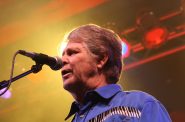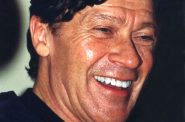The Quiet Seduction of Joao Gilberto
Remembering the sweet Bossa Nova of Gilberto, who didn’t need to play loud.
![Joao Gilberto. Photo by Tuca Vieira from São Paulo, Brazil [CC BY-SA 2.0 (https://creativecommons.org/licenses/by-sa/2.0)]](https://urbanmilwaukee.com/wp-content/uploads/2019/07/João_Gilberto-394x590.jpg)
Joao Gilberto. Photo by Tuca Vieira from São Paulo, Brazil (CC BY-SA 2.0)
When did music get so loud and aggressive? You could ask Pete Townshend, but he probably wouldn’t hear you. Being in one of the original jet-engine-loud rock bands has left him with a hearing problem. Ponder that and file it next to ear plugs in your collection of baffling developments in music. Shortly after The Birth Of Loud (also the title of a fine read on the topic of rock’s two main assault rifles, Gibson and Fender solid body electric guitars, by Ian S. Port), bands were cranking it up up up. It made for a defiant statement not far from the raised fist in terms of friendly invitations.
Let us now consider Blue Cheer. They were a Hendrix-influenced, one-hit (“Summertime Blues”) wonder, who like him used the Marshall amplifier to insure fans in the next town could enjoy the show. Unlike Jimi, who actually had a tender side, these boys seemed to be loaded for bear. They had a manager who claimed they were the loudest band on the planet — so loud ”they turned the air into cottage cheese.” Yum. It was a very Spinal Tap moment in pop history and, sadly, in many ways we’re still there. The torch has now been passed to newer genres like EDM where the artists like to push decibel meters into the danger zone. Lately I’ve given up on some venues because artists I admire have come down with a bad case of shock and awe.
It wasn’t ever thus.
Joao Gilberto shook the world of music in a different way; he whispered. With a voice as gentle as the mist, he intoned the words to “The Girl From Ipanema,” a song so perfect it should be a candidate for sainthood. It was written by Antonio Carlos Jobim, a Brazilian composer I have written about before. On the hit version, Joao sings the first verse in Portugese then hands it over to his astoundingly soothing wife, Astrud Gilberto, to sing in English. She had to learn it phonetically, but manages quite well, Before saxophonist Stan Getz takes over the seduction is complete.
Brazil had great singers reaching for the cheap seats and holding notes in operatic fashion. It had wonderful bands that propelled dancers to the floor. But introspection was not on the menu. Gilberto and Jobim managed to make contemplation danceable. Bossa Nova rhythms, it turned out, were for body as well as the head.
Bossa Nova started in Brazil and had a moment here. Then the Fab Four arrived and I have to admit I was among the traitors welcoming the British forces, strewing their paths with roses. Their music was utterly charming in a way that was not all that different from the Brazilian battalions. The Beatles had sticky melodies, they were sweet, fun and energetic. But by no means were they quiet and neither were their crowds. As they and others who followed got bigger and bigger, their amps did too and soon…well you know the rest.
Here’s the irony. I play electrified music that, while it isn’t all that metallic, can get way louder than I care to hear it. I’m a band leader who has lost the battle and I happily surrender to the wave of energy so easily created with a volume knob or a stomp box. It’s fun, but I know my place in the evolution of music. Like the New Yorker cartoons that show creatures crawling out of the ocean and eventually walking upright, I’m the one with scales and a tail. Joao Gilberto is that graceful bird gliding above it all in the tropical sky. He’s heaven-bound, I assume, and it probably looks a lot like Ipanema.
Sieger on Songs
-
Remembering Brian and Sly
 Jun 26th, 2025 by John Sieger
Jun 26th, 2025 by John Sieger
-
The Legacy of Robbie Robertson
 Sep 28th, 2023 by John Sieger
Sep 28th, 2023 by John Sieger
-
Bill Nighy Sings ‘The Rowan Tree’
 Apr 12th, 2023 by John Sieger
Apr 12th, 2023 by John Sieger




















